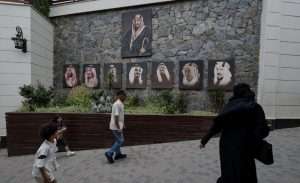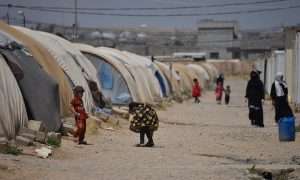William Mullally: Palestinian films only praised if Israeli input exists

On Sunday, for the first time in history, a Palestinian film won an Academy Award. It was for a documentary called No Other Land, which follows a Palestinian journalist through his attempts to protect his West Bank village from Israeli settlers. And with hundreds of millions of eyes on him, Palestinian co-director Basel Adra did not waste the moment.
“We call upon the world to take serious actions to stop the injustice and to stop the ethnic cleansing of Palestinian people,” Adra said to applause.
It must be said, though, that the film is not solely the effort of Palestinians, and thus not an autonomous Palestinian perspective. Standing beside Adra as he made his plea against injustice was his co-director Yuval Abraham, an Israeli journalist.

Abraham is not a typical Israeli filmmaker. In fact, since the film debuted at the Berlin International Film Festival last year, he has been unable to return to his home after receiving multiple death threats. And during his section of the Oscar acceptance speech, he called for an end to the destruction of Gaza and its people, for equality between Israelis and Palestinians, and for the US to stop blocking peace efforts.
But despite these calls, it’s hard to imagine that this awards moment would have been possible had it not been accepted by an Israeli and a Palestinian together. Because for decades, this has been the story of many Palestinian films that have been championed by major festivals and international awards ceremonies.
Israeli-Palestinian co-productions have long been criticised by some Palestinian figures, who have argued these films present audiences with a false happy ending of peaceful co-existence by ignoring key aspects of the Palestinian perspective. And by the time they reach festivals and award shows, the Palestinian filmmaker is treated as merely a prop, with the film’s actual content deemed secondary to the fact that Israelis and Palestinians worked together to make it.
While I don’t believe that No Other Land fits those criteria, particularly because the film’s message has remained front and centre from the moment it debuted, there is something to be said about this recurrent phenomenon. At the Academy Awards, this is the third time a film co-directed by a Palestinian and an Israeli filmmaker has been nominated – first with Ajami in 2010, co-directed by Palestinian Scandar Copti and Israeli Yaron Shandi. It happened again in 2013, with the documentary 5 Broken Cameras by Palestinian Emad Burnat and Israeli Guy Davidi.
“Palestinian perspectives should not need an Israeli co-sign to be deemed worthy. Palestinians have suffered for nearly 80 years under Israeli occupation, and their occupiers should not have a say in which of their stories deserve the world’s attention.”
Other nominated documentaries in the past depicting Palestinians have come from a decidedly Israeli perspective. Promises (2002), from Israeli-American filmmaker BZ Goldberg, features Israeli and Palestinian children discussing their lives under conflict. But while acknowledging Palestinian suffering, it also at times flattens the conflict to a “both sides” problem.
Few films from a purely Palestinian perspective have been given a platform. Two films from Nazareth-born Palestinian director Hany Abu-Assad – Paradise Now (2006) and Omar (2014) – have received Oscar nominations. The former, to note, had an Israeli producer. And short films from Palestinian directors including Basil Khalil’s Ave Maria(2016) and Farah Nabulsi’s The Present (2021) without Israeli top-line credits have received nominations. The British-Palestinian Nabulsi has since been invited to be an Academy member.
Oscar viewers less versed in Arab film may conclude that there are few excellent Palestinian films made without Israeli involvement, but that is hardly the case. Just this year in fact, 22 different Palestinian directors united for a single film called From Ground Zero, with each creating a short film in Gaza as a part of the project. The film, the official Oscar submission for Palestine in the International Feature Film category was shortlisted but not nominated.
Why does this phenomenon matter? Because with an Israeli filmmaker present, an Israeli perspective is inextricably a part of the work itself. This does have genuine value, as it opens the films up to new audiences who otherwise would never watch a Palestinian film. But it removes Palestinian autonomy and hinders the film’s messaging. A Palestinian filmmaker alone may call for a free Palestine. An Israeli filmmaker won’t – even No Other Land co-director Yuval Abraham was calling for equal rights, not for autonomous Palestinian statehood.

Palestinian perspectives should not need an Israeli co-sign to be deemed worthy. Palestinians have suffered for nearly 80 years under Israeli occupation, and their occupiers should not have a say in which of their stories deserve the world’s attention.
The film world has made tremendous progress, and things are still moving in the right direction. A year ago, Jewish filmmaker Jonathan Glazer used his acceptance speech for The Zone of Interest to call for an end to the killing in Gaza and an end to Israeli occupation, which was met with massive backlash. And a year later, a Palestinian film was still embraced by the Academy.
READ: EU suffers from “foot in mouth” again over Ukraine
Knowing the dangers to their careers and their lives, Adra and Abraham spoke with clarity of purpose, and with great bravery. But until a Palestinian is able to stand on that stage without an Israeli by their side, it won’t be a clear Palestinian victory.
READ: Saudi Arabia staunch stance on Gaza
The Arab film community knows this well. That is in part why No Other Land has not received distribution in the Middle East, despite its powerful themes. As long as an Israeli lens is depicting it, many Palestinians will not accept an awards win, at the Oscars or otherwise. And whether they’re validated and platformed by international awards bodies or not, Palestinians will continue to tell their stories. Now it’s up to the Academy and other awards bodies to be brave enough to recognise them.
The views expressed in this article belong to the author and do not necessarily reflect the editorial policy of Maghrebi.org. William Mullally is Arts & Culture Editor at The National. An award-winning culture writer, he’s lived in the UAE since 2009 and chronicled the rise of the region’s diverse creative scenes. He’s served as Dubai Eye 103.8’s film critic since 2013, and has contributed to Arab News, ET Bil Arabi, The Insider Arabia, GQ Middle East, Esquire Middle East, Al Arabiya, Savoir Flair and Harper’s Bazaar Arabia. His long-running celebrity interview series has achieved more than 50 million views across his YouTube and TikTok channels.
If you wish to pitch an opinion piece please send your article to alisa.butterwick@maghrebi.org.
Want to chase the pulse of North Africa?
Subscribe to receive our FREE weekly PDF magazine














